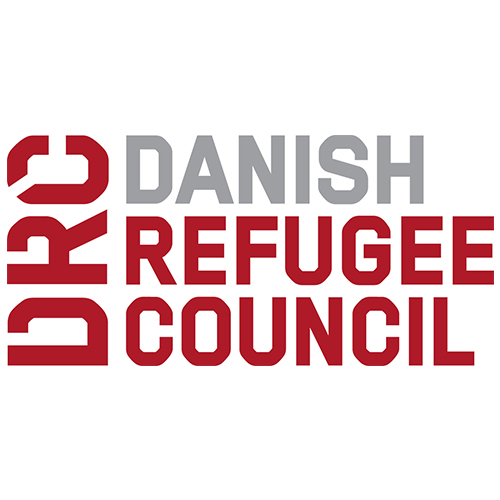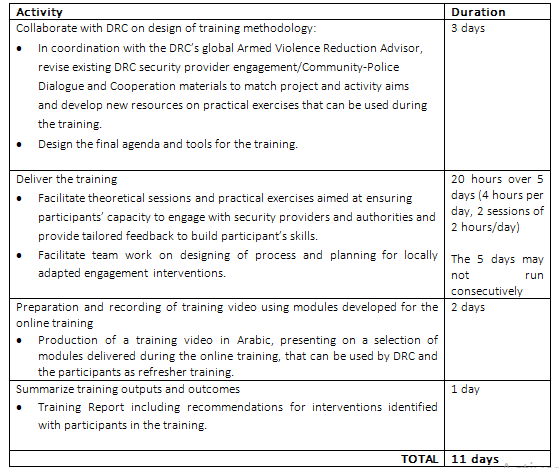Appel à consultation (Online Training to Community Actors on Engagement with Security Providers & Authorities in Tunisia & Libya) – DRC عودة إلى الفرص
Danish Refugee Council
يطلق Appel à consultantsانتهاء الصلاحية
15 جويلية 2021 Il y a 4 ans
شروط الترشّح
أنقر هنا للاطّلاع على شروط الترشّحشارك الفرصة على
تفاصيل الفرصة
المجالات المعنيّة بهذه الفرصة: Sécurité
Provision of Online Training to Community Actors on Engagement with Security Providers & Authorities in Tunisia & Libya
- Assignment: Provision of training preparation and online training delivery of community stakeholders on engaging with security providers and local authorities in communities on the Tunisia – Libya border.
- Grade: Consultant
- Reporting to: Humanitarian Disarmament & Peacebuilding (HDP) Regional Coordinator
- Location of consultancy: Homebased with virtual training
- Time frame: 11 working days in total
Introduction and Background
Danish Refugee Council (DRC) is an international non‐governmental organisation, which promotes and supports durable solutions to the problems faced by refugees and internally displaced people all over the world, and works to improve safety, strengthen community resilience, and build local capacities to reduce and prevent violence and conflict.
DRC began operating in Tunisia in 2011, providing humanitarian assistance to refugees fleeing the Libyan conflict in Shousha camp near Ben Guerdane in the southeast of the country. In 2014 DRC began implementing peacebuilding projects in the same region, enhancing community security and resilience in the border-towns of Ben Guerdane and Dehiba and in March 2018, extended its intervention to the Libyan border-towns of Zuwara, Nalut, and Wazin with a similar approach of community engagement and capacity building to local organisations.
DRC has established community-based Conflict Management and Analysis Committees (CMACs) in each of the five locations where it intervenes and supports the CMACs to conduct regular analysis on conflict dynamics and to design and implement local actions that can tangibly affect peaceful change.
DRC is currently implementing two complementary peacebuilding projects on the borderland areas between Tunisia and Libya. The interventions aim to empower border communities for more effective participation in border management decision making and to address drivers of tension in the border region through designing and implementing tangible solutions to prevent violence and improve living conditions of local communities. DRC supports the CMACs and civil society organisations to address drivers of conflict in their environments and to contribute to long-term objectives of social inclusion, economic development, and democratic governance.
As part of its ongoing projects, training to community stakeholders including the CMACs, civil society organisations and local media actors is foreseen to enhance skills in communicating and engaging with local security providers and authorities, for enhanced and meaningful participation in community safety and associated border management processes.
Consultancy objectives
- In coordination with DRC, adapt existing training materials to the local contexts of the border region of Tunisia and Libya and the needs of participants and prepare required training resources.
- Delivery of two sets of online training to approximately 25 project stakeholders in each group, including CMAC members, civil society members and local media actors from DRC’s 5 areas of intervention (group 1: Ben Guerdane, Dehiba, Tunisia and group 2: Zuwara, Wazin and Nalut, Libya). Each group will receive 2 hours of training per day, over 5 days for a total of 10 hours training per group.
- Recording of brief video-sessions of the developed training modules that can be used by DRC after the training for DRC staff and the participants as a refresher course.
- Produce a training report including key outcomes and recommendations for delivering engagement initiatives in each area of intervention.
Consultancy scope
The overall purpose of this consultancy is to design and deliver online training in Arabic to community stakeholders on methods, skills, and tools for engaging with security providers and authorities in the Tunisia/Libya cross-border context. By the end of the training, participants should understand how an engagement with security providers/authorities can be designed and planned, possible types of engagement, and have the relevant tools to engage with security providers/authorities.
Approximately 50 participants in total will be trained, split into two groups, one group from Tunisia and one from Libya. The specific contexts of each area should be taken into consideration when designing the training content and in supporting participants to design engagement interventions in their own locations.
Methodology
The training should be focused on theory as well as skills application and practice. The training will also provide a space for the participants to discuss, identify, design and plan possible interventions in their own local context.
The training content should provide the participants with the following:
- Learning about types of engagements with security providers/authorities based on previous DRC experiences (Community-Security Provider Dialogue and Cooperation, accountability, community engagement and conflict sensitivity trainings)
- Awareness of conflict sensitivity in working with security stakeholders/authorities and identifying the right actors to engage
- Effective communication and interest-based negotiation and dialogue facilitation skills
- How to design a dialogue process/engagement process for enhancing trust and relation building between communities and security providers adapted to context
- How to design a plan for engaging with local security providers and related authorities adapted to the local context of Tunisia/Libya border areas.
Deliverables
- Production of training agenda, methodology and tools
- Delivery of 20 hours of training over 5 days (4 hours per day, 2 sessions at 2 hours, with a total of 10 hours per group), in Arabic
- Recording of brief videos of a selection of training modules
- Post-Training report
Timeframe
Work under the consultancy should begin upon signature of the contract between DRC and the selected consultant. The total duration of the consultancy will be 11 days including preparation, training delivery and reporting.
Timelines may be revised with consent of DRC. Deliverables are not considered final until approved by the HDP Regional Coordinator. One day of work is equal to 8 hours.
Once the consultant is selected, initial consultations with DRC staff and the adaptation of the training content and methodology is expected to start mid-July 2021, with the training taking place by the end of July.
Reporting Line
The consultant will report directly to the HDP Regional Coordinator, with technical support from DRC’s global Armed Violence Reduction Advisor.
We Offer
DRC will offer the successful applicant an 11 working-day contract.
DRC reserves the right to accept or reject any proposal received without giving reasons and is not bound to accept the lowest or the highest bidder. Only those shortlisted will be contacted for an interview with the panel to ensure their understanding of the consultancy services.
Any subcontracting of the consultancy will not be accepted.
Assessment and Award of Consultancy
DRC/DDG will evaluate the proposals and award the assignment based on technical (50%) and financial (50%) suitability. The technical component will be evaluated using the following criteria:
- Experience
- Demonstrable experience in facilitating training relevant to the call (total weight 20%)
- Qualification
- Qualified trainer and assessed in the 3 examples of previous training experience (total weight 20%)
- Language
- Arabic mother tongue and experience in English speaking work environments (total weightage 10%)
شروط الترشّح
- Experienced trainer/s with practical experience of engagement with community stakeholders and experience of facilitating training on the following topics: Community engagement, communication, interest-based negotiation, and dialogue facilitation skills / Designing of conflict sensitive community/stakeholder engagement processes that aim for trust and relation building / Previous experience in working with how civil society can engage with security providers, direct engagement with and training of security providers will be considered an asset
- An understanding of the context in Tunisia and Libya
- Excellent verbal and written communication skills in English and Arabic
- Experience of adult learning methodologies
- Strong knowledge of online and interactive learning methodologies
- Knowledge and familiarity with virtual platforms and online tools Strong organizational skills
انتهت صلوحية الفرصة
للأسف هذه الفرصة لم تعد موجودة على جمعيتي . زوروا بانتظام قسم الفرص لتجنب افلات الفرص اللاحقة
تابع "جمعيتي" على لينكد إن
احصلوا على جمعيتي موبايل من الآن

Appel à consultants منشور على "جمعيتي" في 5 juillet 2021
إكتشف المزيد من الفرص على "جمعيتي" عبر النّقر على هذا الرّابط.


